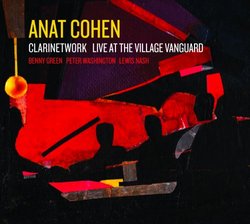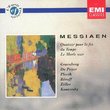| All Artists: Anat Cohen Title: Clarinetwork: Live at the Village Vanguard Members Wishing: 3 Total Copies: 0 Label: Anzic Records Original Release Date: 1/1/2010 Re-Release Date: 4/13/2010 Genres: Jazz, Pop Style: Number of Discs: 1 SwapaCD Credits: 1 UPC: 896434001320 |
Search - Anat Cohen :: Clarinetwork: Live at the Village Vanguard
 | Anat Cohen Clarinetwork: Live at the Village Vanguard Genres: Jazz, Pop
Anat Cohen's Clarinetwork - Live at the Village Vanguard, inspired by Benny Goodman and celebrating his centennial, is a musical tour-de-force. Winner of 3 consecutive Jazz Journalists Association "Clarinet Player of the Y... more » |
Larger Image |
CD DetailsSynopsis
Product Description Anat Cohen's Clarinetwork - Live at the Village Vanguard, inspired by Benny Goodman and celebrating his centennial, is a musical tour-de-force. Winner of 3 consecutive Jazz Journalists Association "Clarinet Player of the Year" awards and multiple "Rising Star Clarinet" DownBeat critic's polls, Cohen leads an all star rhythm section (Benny Green, Peter Washington, Lewis Nash ) on this seminal live recording that returns the clarinet to its rightful role at the forefront of jazz. Similar CDs
|
CD ReviewsAnat Chen's Latest is greatest J. D. Traiger | Milford, MA | 04/15/2010 (5 out of 5 stars) "Anat Cohen's recent release of Clarinetwork is her best outing on the clarinet. She mentions her homage to Benny Goodman in the jacket notes, and rightly so. He would highly praise her work. I think, however, in the upper register, Goodman's tone was more flowing and melodic; Anat's a bit more on the hard jazz side. This only shows that their individual styles are different, not that one is better than the other. Anat, however, is willing to run a blusey lick and work it into a gusty bop phrase. Goodman was more traditional, as he usually stayed away from this type of experimentation. Anyway, Anat, on the clarinet, is the REAL DEAL! It's just wonderful to see such exciting talent given to the "long lost" instrument of jazz. The young reed players emerging on the jazz scene today (like Anat Cohen and Grace Kelly) give us all encouragement that great jazz, expertly played, will be around for yet another generation to pass on." Homage to Benny Goodman ... Giordano Bruno | Wherever I am, I am. | 04/30/2010 (5 out of 5 stars) "... was the starting point for this live-concert recording on the centennial of Goodman's birth. One can be sure that Goodman is an iconic figure for Anat Cohen, not only as a clarinetist but also as a jazz musician of Jewish heritage. Cohen was born in Tel Aviv and, like Goodman, classically trained, at the Berklee College of Music in Boston. Her physical virtuosity, both of finger-work and tone control, is phenomenal. The 'standards' recorded here are all familiar Benny Goodman classics; Anat Cohen nearly always launches them from Goodman's melodic base, and that's what you'll hear in the MP3 samples, those famous 'swing' riffs. But when you hear the whole tracks, you'll quickly realize that Goodman's stylizations are only the starting point for post-bebop improvisations of hard-driving physicality.
The clarinet has an odd history as a jazz instrument. It was a key player in the Dixieland combo, and Goodman made it the characteristic voice of "swing". But it never caught on as a blues instrument, and it was largely absent from sax-dominated bebop. West coast 'cool' jazz had Jimmy Giuffre on clarinet, but if anything, Giuffre's calculated sound reinforced that supposition that the clarinet was a 'white' instrument, too sedate and classical for real jazz. In fact, the clarinet was the "hot" instrument par excellence of another tradition, that of Eastern European and Balkan popular music, especially of the klezmorim. Benny Goodman was a scion of klezmer tradition, and Anat Cohen is another, though her tribute to klezmer music is to be heard only in her fiery improvisatory flights and not in any overt ethnic influences. There's nothing especially innovative about Cohen's playing on this CD; it's just a skilled synthesis of swing and bebop. But the piano of Benny Green is innovative enough for two. Green has been around for a couple decades already, but his teaming-up with Anat Cohen seems to have liberated him from his Oscar Peterson smooth 'n sweet pianism. Even on these swing-era standards, he sounds like a new musician to me. He's an immensely physical pianist, an 'animal' on the whole keyboard, combing huge finger-spread chords with dazzlingly speedy passage-work. On stage, while taking his solos, he's a dervish, literally hurling himself at the keyboard; then he takes his applause like a kid at a first recital, disarmingly surprised at his own intensity. It's all in the details of phrasing and nuances of harmony, the pleasure one gets from these renditions of jazz standards. Listen to what Green adds to the bass and drum solos - his little flicks of rhythm and at-first puzzling insertions of off-key chords. Green's harmonic freedom isn't random; he knows where he wants to steer the energy of his ensemble mates, and when they 'pick up' on his cues, the music soars." |

 Track Listings (8) - Disc #1
Track Listings (8) - Disc #1
